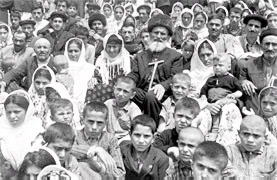|
Summer 1998 (6.2) The Centenarians
of Azerbaijan's Lerik Region
LERIK, Azerbaijan-Something
appears to be keeping people in this breathtaking mountain village
alive longer than anywhere else on Earth. It could be the clean
water, the bracing air or a life of back-breaking labor. "I never eat it," Mirzahan Movlamov said dismissively. "Never." In his case, never is a long time. At 121, Movlamov is the oldest man in a village famous for centenarians and, according to his birth documents, one of the oldest people in the world. He lives in a bare room with his third wife (nearly half a century younger than he is) and is usually surrounded by dozens of children, grandchildren, great-grandchildren and great-great-grandchildren. This place may be as close on Earth as it gets to Shangri-La-the mythical land where people seem to live forever-but it certainly is bizarre. There are scores of astonishingly old people living here, on a mountain ridge just a few miles from the Iranian border. For a while the Guinness Book of World Records recognized somebody from a village nearby, Shirali Muslimov, as the oldest man who ever lived. Born in 1805, he died 25 years ago, reportedly at the age of 168. People here don't really have family trees; they have family forests. Movlamov, for instance, has a 41-year-old son (conceived when he was 80 and when his current wife was 36), and he has an 84-year-old grandson, who descended from Movlamov's first wife. In between, there are scores of others, some children from his most recent marriage who are decades younger than grandchildren he has from his first marriage. He has one son, a grandson and a great-granddaughter all born within two years of one another. His first wife was his true love. They were married in 1905, when he was 28 and she was 12. "I stole her," he said, matter-of-factly, speaking in a rare mountain dialect [Talysh], which was then translated into Azeri by one grandson and from that into Russian by another. "I rode into the next village on my horse and grabbed her. I was in the czar's cavalry at the time. I loved her very much." He and his first wife were happily married until she died in 1954-at the age of 61, which passes for adolescence in these parts. He says she never mentioned his abrupt courtship-the theft of young women being the traditional way mountain men obtained their brides. For the millions of Americans obsessed with gurus, diet doctors, spiritualists and New Age herbalists who promise to tell them how to live forever, a trip to this part of the world might seem appealing. But it isn't likely to answer their questions. It's hard to say why people here-poor, poorly served by medicine and mostly ignorant-live a long life. They don't eat much, and they work like beasts. Vegetables, fruit and sour cheeses are dietary staples. The water 300 miles south of Baku is as clear as the azure skies. The crisp mountain air seems good enough to eat. Still, when Azerbaijan was part of the Soviet Union, doctors descended on the place and took a bunch of blood tests. They found nothing conclusive, and most researchers tend to attribute longevity here to a combination of clean, stress-free living and genes that are programmed to last. From Azerbaijan International (6.2) Summer 1998. |

